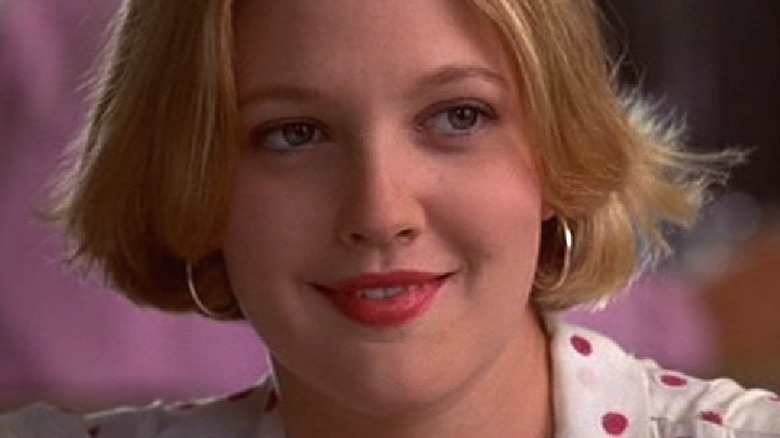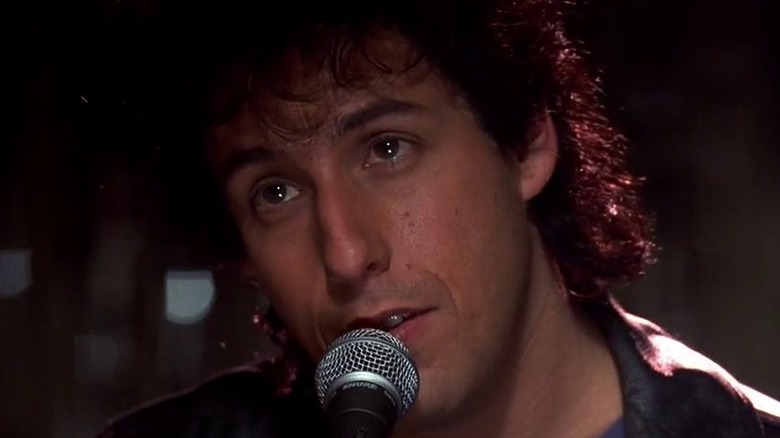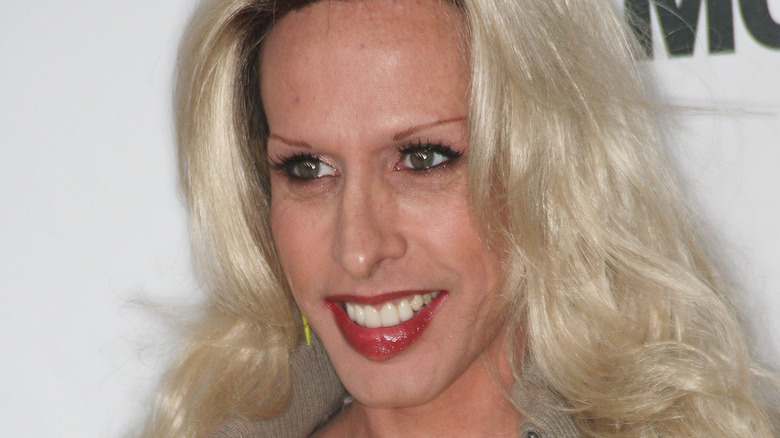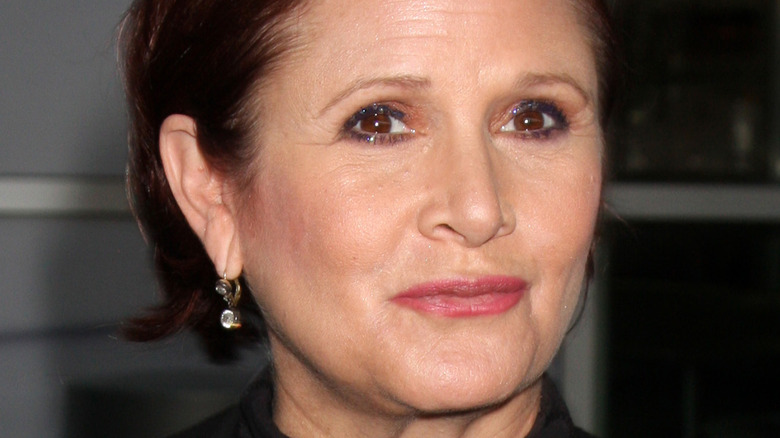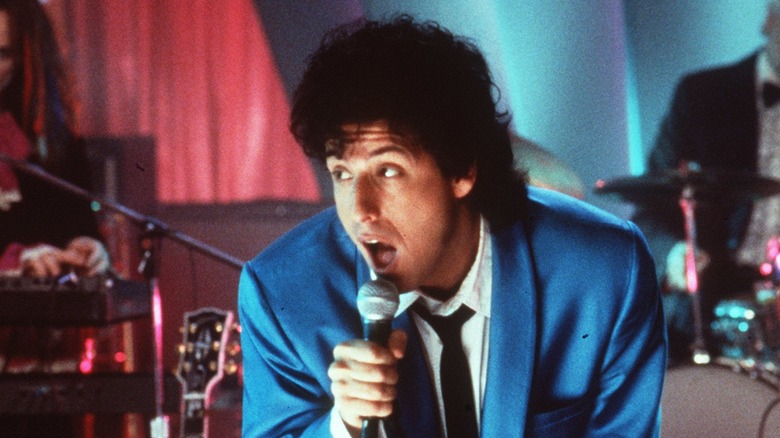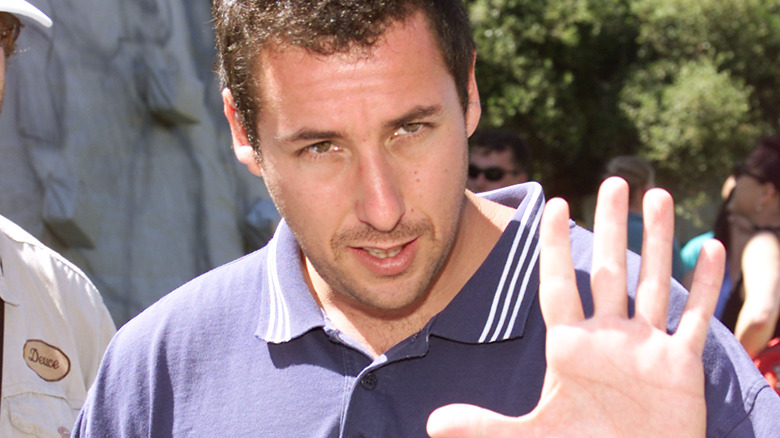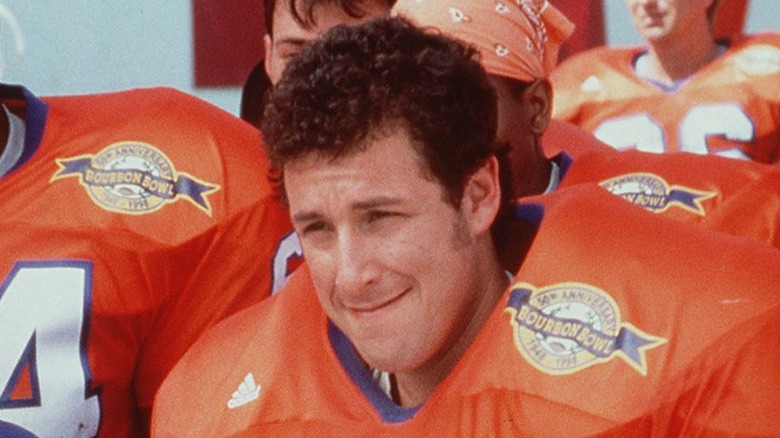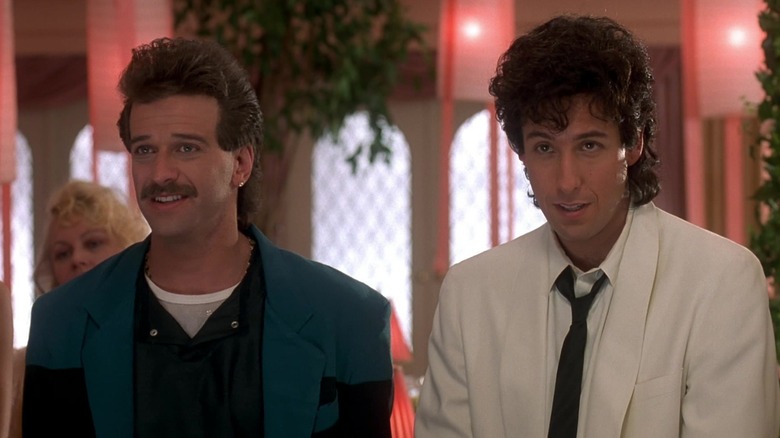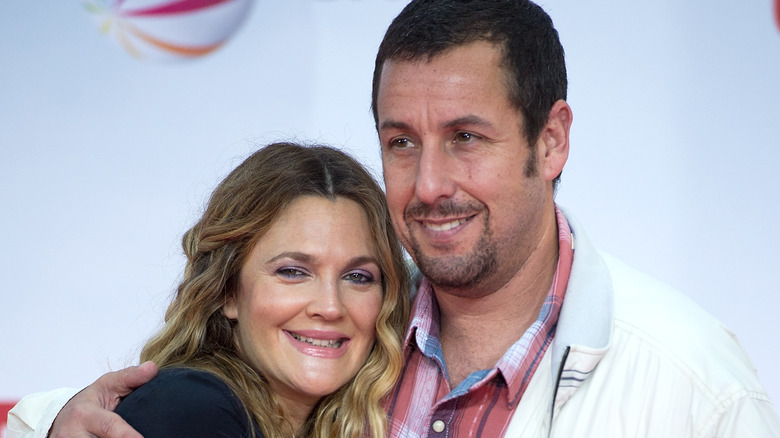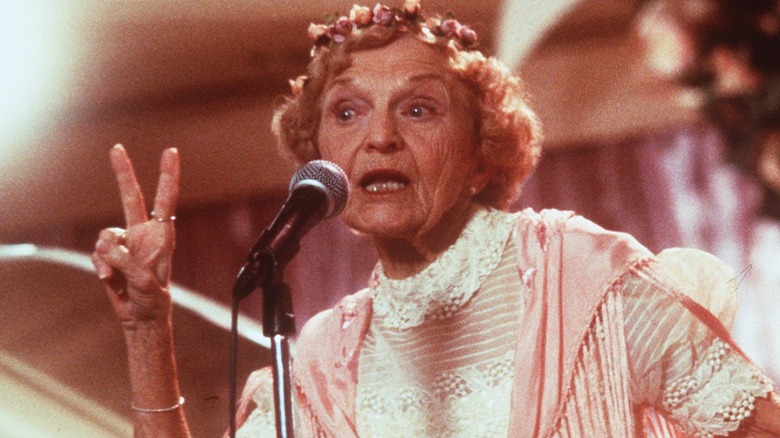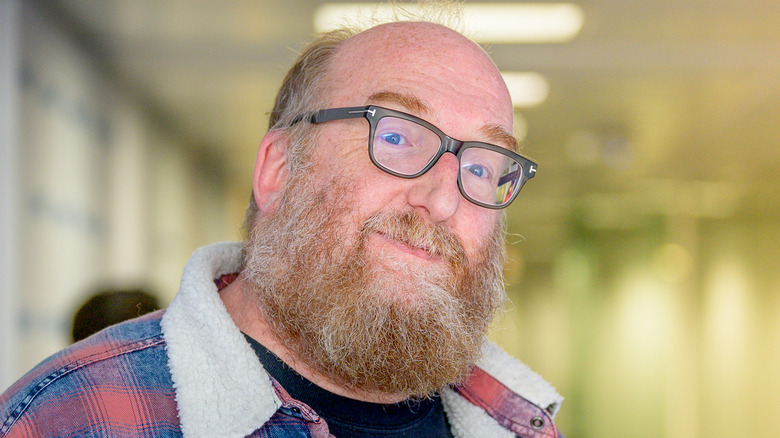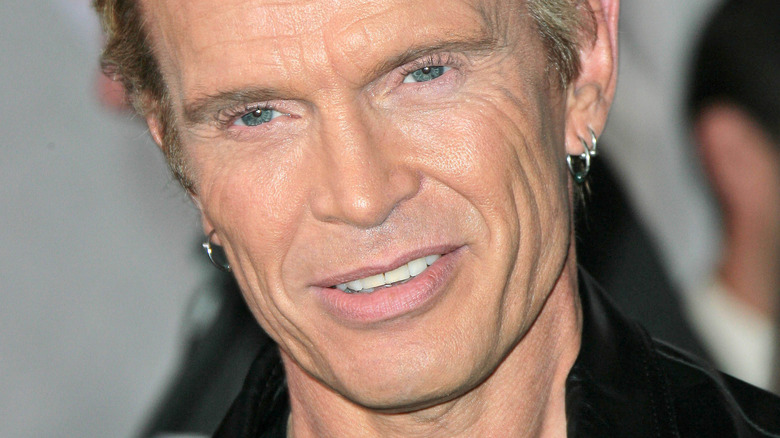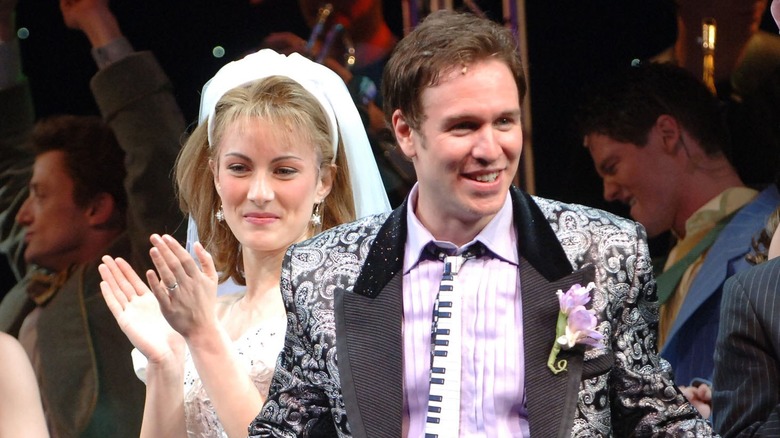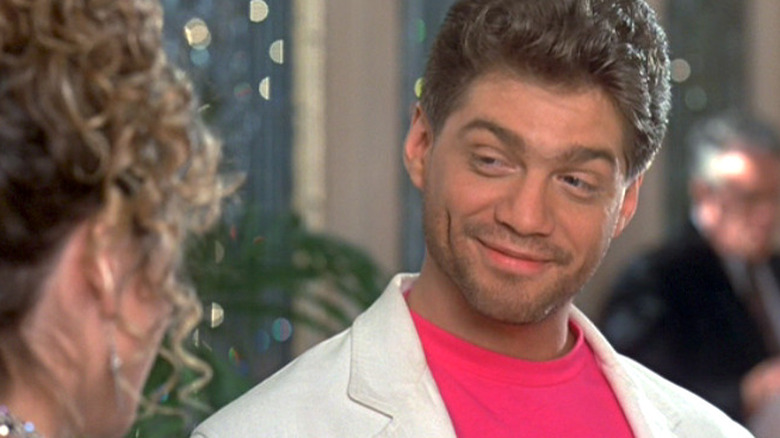The Untold Truth Of The Wedding Singer
Just as Jim Carrey's time as Hollywood's top goofy comedy star was winding down, it seemed like he passed the baton to Adam Sandler, who carried it for the rest of the '90s. Indeed, Carrey began to move away from silly physical comedies after 1995's "Ace Ventura" sequel, which happened to come out the same year as Sandler's breakout movie, "Billy Madison." Sandler followed that up with a second character-driven comedy called "Happy Gilmore" the following year, easily avoiding the kind of sophomore slump that many of his contemporaries had to endure — "Black Sheep," anyone?
While he would soon start upping the ante with his wild characters by giving them funny voices and more specific gimmicks in "The Waterboy" and "Little Nicky," Sandler took his first detour into proving he could just play a regular guy in a fairly grounded comedy. 1998's "The Wedding Singer" showed that Sandler could carry a romantic comedy and didn't need a silly voice or a man-child persona to make audiences laugh and rake in the cash at the box office.
Of course, the bottomless charm of Drew Barrymore — and her effortless chemistry with Sandler — also deserve credit for making "The Wedding Singer" shine, as does a great ensemble rounded out by Allen Covert, Christine Taylor, Alexis Arquette, Matthew Glave, Christina Pickles, and a memorable surprise cameo by a certain snarling '80s rocker. Here's what went into making Sandler's radical retro rom-com.
It was originally going to be another slapstick comedy
According to "Wedding Singer" screenwriter Tim Herlihy — Adam Sandler's college roommate turned professional partner for close to 40 years at this point — there wasn't a conscious effort to make the film drastically different than "Billy Madison" or "Happy Gilmore." The formula had been working for both the fans and the box office receipts, so there wasn't a need to reinvent it. But as work got underway on the pair's third film, it ended up evolving into a more grounded and more romance-focused film naturally.
Herlihy credits the fact that he had recently gotten married as part of the reason why the script began to become more of a grown-up romantic comedy rather than another slapstick romp about a bumbling man-child. He also says that the change was inspired by Sandler's terrific chemistry with Drew Barrymore, and the fact that test audiences didn't mind scenes where her character was the focus and Sandler wasn't on screen at all. The latter was deemed unacceptable by test audiences of the previous two Sandler films, forcing those movies to cut almost any scene that Sandler wasn't in.
Boy George loved Alexis Arquette's performance
Adam Sandler wisely surrounds himself with fantastic character actors in his films, and one of the best that he ever worked with was Alexis Arquette. While Arquette's Boy George-obsessed "Wedding Singer" bandmate could have easily been extremely one-note and only useful for a single punchline, George Stitzer proved to be an effective and ongoing presence throughout the film and was responsible for just as many warm moments as funny ones.
It seems obvious enough that Arquette's performance came from a place of affection for the "Karma Chameleon" singer, but it isn't always clear how the person being parodied is going to take the impression. However, during a concert with his band Culture Club the day after Arquette passed away in 2016, George paid tribute to Arquette, saying she played him "very hilariously" and that he was "rolling around on the floor laughing" at Arquette's work in the film. He then dedicated his performance of his classic song "Do You Really Want To Hurt Me" to Arquette, as that was the song she got stuck singing over and over again to an increasingly frustrated audience in her biggest scene in the film.
Carrie Fisher did uncredited work on the dialogue
All due respect to Bridgette Wilson and Julie Bowen — both fine actors who played Sandler's love interests in "Billy Madison" and "Happy Gilmore," respectively — but they weren't exactly the deepest or most complex female leads in movie history. Oftentimes, if you need a character to have a real woman's voice, you need to get a woman to write her words. That is exactly what happened when none other than Carrie Fisher was brought in to do uncredited script doctor work on "The Wedding Singer," specifically to tweak the dialogue of Drew Barrymore's character.
In fact, Fisher had been doing that very thing for years, on a number of different movies. Her earliest examples of uncredited dialogue work came in the original "Star Wars" films. She grew frustrated when Harrison Ford's rewriting of his own Han Solo dialogue began to have a negative impact on Princess Leia's lines, so she decided to rewrite hers as well. George Lucas liked her work so much that he asked her to write an episode of "The Young Indiana Jones Chronicles" and also help him with the dialogue in the "Star Wars" prequels. Fisher eventually became "one of the most sought after [script] doctors in town," doing script work on such films as "Last Action Hero," "Hook," "Scream 3," and "Coyote Ugly."
It helped kickstart the retro worship trend
Having movies, TV shows, and video games that are steeped in a particular era and built around the pop culture environment of said era is a common thing now, and has been for a while. But in 1998, it hadn't been done much yet. Sure, a movie like "Grease" or a show like "Happy Days" both served as obvious love letters to the 1950s, 20 years after the fact, but they weren't absolutely jam-packed with references to that era at every turn. Some have made the argument that this type of retro fetishism was started with "The Wedding Singer," for better or for worse.
What set "The Wedding Singer" — and also "That '70s Show," which debuted the same year — apart from previous homages to a bygone era is the way that it was wall-to-wall songs, references, and in-jokes to its decade. Barely five minutes goes by that "The Wedding Singer" doesn't hit you over the head with its '80s-ness in some completely obvious way and never lets you forget when the movie takes place or what pop culture was like at the time. It would set the stage for a full-on explosion of worship for the 1980s in the 21st century that hasn't let up much since, with the 2020s thus far seeing yet another resurgence of media drenched in '80s nostalgia.
It's Adam Sandler's highest-rated comedy on Rotten Tomatoes
Adam Sandler movies, at least the ones that he either co-wrote or were written specifically for him, have rarely been a hit with the critics. It's only when he appears in a movie that he merely acts in — like "Punch-Drunk Love" or "Uncut Gems" — that critics manage to appreciate his work. Considering he has a net worth of almost half a billion dollars and was eventually deemed worthy of $20 million-per-movie paydays that are typically reserved for blockbuster action stars, it's clear that the moviegoing public doesn't see eye to eye with the critics. He's probably just fine with that.
With all that being said, not all "Adam Sandler movies" have been met with unanimous disapproval from critics. In fact, even "Happy Gilmore" managed to just squeak by with a "Fresh" rating on Rotten Tomatoes. Most of his other "Fresh" movies were of the aforementioned "not written by or for him" variety with the exception of "The Wedding Singer," which comes in at a respectable 69% and puts it as his highest-rated of his own films and fifth overall of all his movies to date. While a few of the higher-rated movies have comedic elements, they are just as equally (if not more so) dramas, and the case can easily be made that "The Wedding Singer" is the highest-rated pure comedy of Sandler's career.
It disrupted the tradition of annual Adam Sandler movies
Adam Sandler movies were basically an annual event in the '90s, with the question often being, "What is this year's Adam Sandler movie about?" Every fall meant a new Adam Sandler comedy — until New Line Cinema messed that all up when they decided that "The Wedding Singer" would work better if it was released close to Valentine's Day. So they pushed it from its originally-planned fall 1997 release into February 1998, in hopes that couples would see it as part of a romantic dinner and a movie date.
It's hard to tell how much more business the new release date actually drove to the movie and how much of it was just Sandler's huge star power at that time, but the box office tallies no doubt made New Line very happy (more on that later). Still, the side effect was that 1997 saw zero new Adam Sandler movies, while 1998 saw two: "The Wedding Singer" in February, followed by "The Waterboy" in November. Moviegoers clearly didn't have Sandler fatigue at that point as "The Waterboy" was also a huge hit — much bigger than "The Wedding Singer" in fact, with more than double its domestic box office. Combined, Adam Sandler movies brought in roughly $242 million at the box office that year just in the U.S., with only two comedies, an impressive figure no matter how it's distributed.
Adam Sandler's college buddies got more than bit parts
Adam Sandler movies reuse a lot of the same actors over and over again, like his frequent use of "Saturday Night Live" co-star Rob Schneider or his tradition of getting Steve Buscemi to give 110% even in the most ridiculous of cameos. But he's also been generous when it comes to finding parts for some of his old pals, including Allen Covert, Peter Dante, and Jonathan Loughran, giving them roles both in front of and behind the camera. Loughran has also served as Sandler's assistant, while Covert has been a producer on basically every Happy Madison production to date.
Sandler initially didn't have the clout for this. It wouldn't start until he was able to get Covert a mostly non-speaking role as a homeless caddy in "Happy Gilmore." But on "The Wedding Singer," Sandler could finally pull the strings needed to not only get Covert a major part as Robbie's best friend, but he also brought Peter Dante into the fold with a minor role in the beginning (he's the guy who encourages the kid to drink in the opening scenes of the movie). Covert, Dante, and Loughran would go on to have bigger roles in subsequent Sandler movies, and have even forged careers outside of Happy Madison as well. Loughran, for instance, has appeared in two Quentin Tarantino movies: "Kill Bill" and "Death Proof."
Drew Barrymore predicted her chemistry with Sandler
It's impossible to deny what a wonderful onscreen couple Adam Sandler and Drew Barrymore make. Their chemistry is palpable from their very first scene together in "The Wedding Singer," and it is very easy to see how quickly they are able to fall in love despite the obstacles that stand in the way of them being together. Barrymore claims that she could tell she and Sandler would be great together even before the two met. She says she approached Sandler and revealed that she believed them to be "cinematic soul mates," a claim which she admits must have sounded crazy to him at the time but would soon prove to be quite accurate.
Not only were the two great together in "The Wedding Singer," but they reteamed on "50 First Dates," which was yet another example of how well they clicked onscreen. It would also be the first time that Sandler revisited a female co-lead, something he typically does only in direct sequels like "Grown Ups 2." In fact, the duo couldn't resist making a third movie together, which they did in 2014's "Blended." That one might have failed to recapture the magic (or the box office) of their previous pairings, but it definitely speaks to how well the two actors get along and enjoy working together that they've appeared as co-leads in three films so far.
It spawned two hit soundtracks
These days, we take for granted the availability of music. In the mood to listen to "Love My Way" by The Psychedelic Furs? Simply cue it up on Spotify or buy it on iTunes. It wasn't that way in the '90s, hence the appeal of "Now That's What I Call Music" compilations and movie soundtracks. In the case of "The Wedding Singer," buying the soundtrack was an easy and affordable way to instantly own a collection of a dozen or so classic '80s hits all in one place, without having to seek out and buy all of the full albums the songs originally appeared on. A lot of people jumped at that chance, as the soundtrack went double platinum in the U.S. and also sold very well in Canada, Australia, and the U.K.
The soundtrack for "The Wedding Singer" was so successful, in fact, that it was the rare example of a movie soundtrack later having a "Volume 2." The second installment not only included songs from the movie that weren't among the first batch, but also corrected the egregious error (or perhaps shady marketing ploy) of not including Adam Sandler's "Grow Old With You." In fact, both "Wedding Singer" soundtracks are so well loved that they've even since been re-released in vinyl format, which is fitting for a collection of '80s tunes.
This was the film debut of comedian Brian Posehn
With so many scenes in "The Wedding Singer" taking place at weddings, the movie is full of crowds of people that are difficult to keep track of. Among those crowds is an actor who was at the time mostly known only to stand-up comedy nerds, but would soon be familiar to mainstream audiences as well.
During Robbie's bitter performance of "Love Stinks," he goes around and gets various eclectic members of the crowd involved — from a woman with sideburns to a man stuffing his face to an entire table of people he regrettably refers to as "mutants." Among the group of people at table nine that Robbie is cruel to — for no other reason than having a quirky look — is comedian Brian Posehn in his first (though uncredited) film role. He's easy to miss at first, but once the entire table belts out "love stinks!" in unison he's much easier to spot.
Posehn had previously landed small parts on TV shows like "Friends" and "NewsRadio," but also made a name for himself prior to "The Wedding Singer" with various roles on "Mr. Show with Bob and David." He followed up the movie with a recurring role on "Just Shoot Me!" and a steady stream of TV and movie appearances after that, becoming more than just a "that guy" who popped up briefly in things here and there.
Billy Idol did the movie because his son loved Adam Sandler
Surprise cameos were much easier to keep a secret in the days before the internet. If "The Wedding Singer" were released now, the entire internet would have been buzzing about the big Billy Idol cameo days after the movie was released — and that's if it managed to remain a secret before the movie even officially hit theaters. But anyone who saw "The Wedding Singer" in the first few weeks of its theatrical run likely had no idea that '80s music icon Billy Idol appeared in the movie as himself during the pivotal scene where Julia finally officially picks Robbie over Glen.
Idol would later admit that the main reason he did the film was that his son was a huge Sandler fan, and he reasoned that if he was going to have to see the movie anyway, he might as well be in it. But it ended up being good for his career, as it introduced him to a whole new generation of fans who Idol says continued to follow him for years after the fact. Idol's cameo remains one of the most fun parts of "The Wedding Singer" and, fortunately, he hasn't since become a problematic figure whose appearance in the movie taints it — as has happened with so many other celebrity cameos.
It was adapted into a Broadway musical
Although Robbie sings a lot in "The Wedding Singer," both as part of his gig and just in impromptu performances for Julia, it isn't technically a musical. But it became one when screenwriter Tim Herlihy teamed with Chad Beguelin and Matthew Sklar to adapt it into a full-fledged Broadway production. After previews, it officially opened in February 2006 and ran until the end of the year on Broadway before becoming a touring production in 2007 and beyond. Versions of the "Wedding Singer" musical have been performed in at least 30 cities in the U.S., as well as Canada, Europe, and Australia.
While "The Wedding Singer" movie was never going to rack up any Academy Award nominations, the musical was much better respected by their live theater counterpart. The show was nominated for five Tony Awards: Best Musical, Best Book of a Musical, Best Original Score, Best Choreography, and Best Performance of an Actor In A Leading Role in a Musical. It didn't end up winning any of those awards, but it's still impressive that the "Wedding Singer" musical can proclaim that it's a five-time Tony Award nominee.
It was the first Adam Sandler movie to gross over $100 million
As Adam Sandler built up his resume of lead roles in the '90s, there was a time when each movie did better than the last at the box office. "Billy Madison" grossed $25 million, "Happy Gilmore" topped that at $39 million, and then "The Wedding Singer" blew them both out of the water with an $80 million domestic box office tally. Needless to say, Sandler had arrived as a bankable comedy movie lead.
But what "The Wedding Singer" also announced the arrival of was Adam Sandler as a global superstar. While his previous two films barely did any business outside of the U.S., "The Wedding Singer" added a combined $43 million in its global release, pushing him over the $100 million mark worldwide for the first time. Granted, he had no trouble passing $100 million just in the U.S. on his next handful or so of releases, not counting notable early outlier dud "Little Nicky." But it's still important to take note of the movie that first got him into the nine figure club and extended his reach beyond the States, and that movie was "The Wedding Singer."
